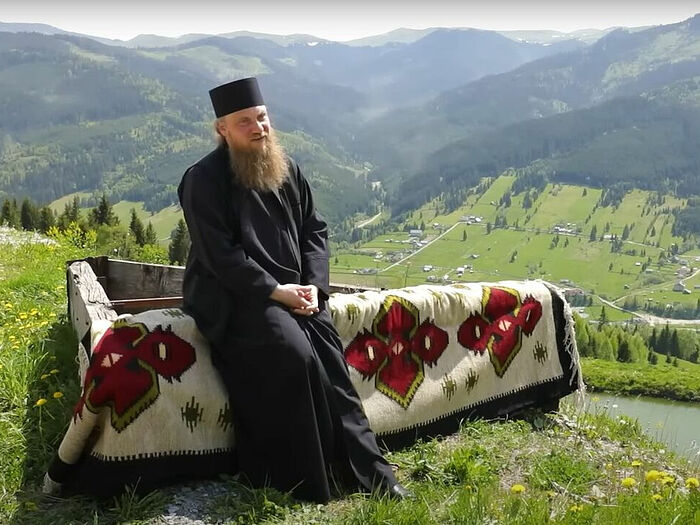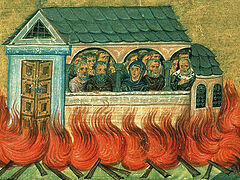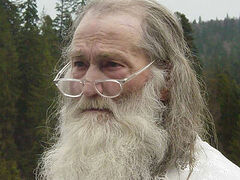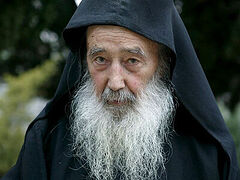During the years of Communist rule in Romania, monastics were expelled from monasteries, monasteries were closed and turned into warehouses, hostels, prisons and anything else as long as they ceased to be houses of God and hearths of holiness. The expelled monastics fled in great numbers to the mountains and hid there in the impenetrable forests. There were secret ascetics in the wild forests of Bucovina, for example, near the village of Botuș, where cattle grazed in the mountains in summer, and in winter the cattle yard was empty. There was a whole convent in it, invisible to anyone, without water, food, light, or heating. Services were celebrated in the attic of a cowshed. The abbess was cooped up there. The father-confessor lived in a pigsty. The nuns slept in a sheep shed.
Thirty-five years ago the godless regime fell, and little by little a wooden skete in honor of the holy Apostles Peter and Paul appeared in this place, named according to Romanian custom the “Botuș Monastery”. Today’s monks of this prayer-soaked place try to be worthy successors of their heroic predecessors, the nuns. An atmosphere of prayer and asceticism reigns in the skete, as evidenced by its second name, the “Little Romanian Athos”. We offer our readers a talk by the abbot of Botuș Monastery, Fr. Galaction, who was tonsured by Bishop Chesarie (Paunescu), a confessor of the faith.
 Protosinghel Galaction (Dominte)
Protosinghel Galaction (Dominte)
What is repentance?
True, God loves us unconditionally. Moreover, when we read the Gospel, it seems that God loves sinners more than others, and St. Matthew says this plainly, calling the Savior a friend of publicans and sinners (Mt. 11:19). He even said to Judas, Friend, wherefore art thou come? (Mt. 26:50). He called Lazarus a friend as well: Our friend Lazarus sleepeth (Jn. 11:11).
But it is also true that we want to be told all the time that God loves us. Not because we forget about it, but because we like to be reminded all the time that there is someone who loves us, especially since it is God Himself.
And what do we do with this love? We cannot even imagine how much God loves us, because if we understood how much love God pours on us and how much love He has for us, our hearts would melt. We can’t even contain His love. But when you receive something, you must give something back. In the prayer called the Liturgical Anaphora it is said of God the Father: “Who hast so loved Thy world as to give Thine only-begotten Son”, and of the Savior Christ it is said, “In the night in which He was given up—or rather gave Himself up for the life of the world”. You see, the Love That gives Itself up! What you keep for yourself makes you poorer—you must give out love. And what do you give, sacrificing from your comfort, laziness, and complacency? What do you give to God? This love automatically encourages us to give.
We see God, but we see Him disciplining us depending on the extent of our repentance. Not our false idea of repentance (how we often understand it). Not mere regret: “Oh, how sinful I am! Oh, how weak I am! Oh, how much I have sinned — God will not forgive me! It’s just regret. To repent means to feel the heart of God in your heart, to realize how much God loves us, to purify your feelings and see Christ. And we see Christ to the extent that we purify ourselves. This is how we see God.
We feel uncomfortable because God loves us, but we don’t do anything in return and can’t reciprocate. This way, we don’t grow at all. Genuine love, which transforms you from a mere individual into a personality, prompts you to respond to Him somehow—not because God needs our love and not because God coaxes something out of us. True love means freedom. God does not want us to tell Him that we love Him if we do not feel it. The Apostle Peter said after the Resurrection of Christ, when the Savior asked him: Simon, son of Jonas, lovest thou Me? And he replied: Lord, Thou knowest all things; Thou knowest that I love Thee (Jm. 21:17).
God does not need us to answer out just to be polite. God knows what’s in our hearts. And if we were sincere with ourselves, I think our answer would be like this: “Lord, You know that I want to love You, but there are other loves in my heart too!” If we were frank with ourselves... But sometimes we feel comfortable doing nothing and saying that “God is love”, and that “God accepts us as we are”, and we hunt out all sorts of formulas to persuade ourselves to come to terms with ourselves. However, the true knowledge of yourself, which is so much preached about, is when you see God inside yourself. And the God inside you loves the One in another person, and the God inside you cries out to God in Heaven. Otherwise, we deceive ourselves. After all, God is reflected only in the pure water of our being, and not in the rotten swamps of various philosophies of this world.
We see God purifying us as we repent. And repentance means a change of mind; it means, as we said, that first of all we must come to know God, understand that we have a borrowed life and that we are not autonomous (as the thinkers of our age wrote: the “autonomous man”, or the “new man”, who does not have a deep connection with God), and realize that we owe our lives to God.
Now it is fashionable (and I have seen it) to always tell yourself that “God loves us as we are, and we must love ourselves first of all.” But know that love for yourself can be different! There is good love for ourselves, stemming from the awareness that God has put into us, because we know that we are children of the Kingdom, that we are children of God, that we were created for eternity and are not content with this world. And there is bad love for ourselves when we allow ourselves anything, when we think and do whatever we like…
I liked an incident that a lady dentist told me about. It clearly shows how today’s society makes use of this second self-love and tries to indulge our ego. She said that once she saw a sunblock (in our days the sun is scorching mercilessly), produced by a company (heaven knows what company it was) that promised everyone endless happiness and life without death. It read: “Because you deserve it!”, and she bought it. But maybe she kept it improperly, or they had advertised it in vain, or it had past its expiration date, but when she started using it, she began to have skin problems—eczema. Then her husband joked with her, saying: “After all, you deserve it.”
Thus, we sometimes deserve to be deceived. Modern society and people promise us a lot of good things, but I don’t know if they really wish us well. Only God wishes us well, and only God loves us, because He knows what He has put into our hearts.
No one knows this particle of God—only God knows it and keeps it in His treasuries, because He knows that we are priceless and that there is this spark of Divinity even in the worst criminal, in which God must be reflected.
And repentance is the purification of the water of our being so that God can be reflected in it. And we are not necessarily talking about Confession here, because sometimes we resort to a father-confessor only for a blessing, only for psychological comfort, and go to church only for Sunday rest, adhering to a certain regimen. But if there is no God in it, all of this has no value. This is a magical faith in which we do not pin all our hopes on God. Thy bridal chamber I see adorned, O my Savior, and I have no wedding garment that I may enter.” This is the opposite of our state; we must enter the bridal chamber of God dressed in clean garments. We can ask God, “Lord, love me as I am!”. Yes, God loves you, but we need to change our clothes if we want Him to take us in His arms.
A particle of God
I was pondering whether there is any trace of God in the worst people. And there is a verse in Psalm 32 that says: He layeth up the depth in storehouses (Ps. 32:7). What is it that is so valuable, that God keeps it in His storehouses? A particle of God, a spark of Divinity, which can be also seen in the soul of the worst criminal. And God will look into this spark, into this particle of God in the next world, in His Kingdom, at the moment of the Last Judgment to see if He is in us. And do we find God?
We find God in the world around us, we find God in prayer… I remember Fr. Dumitru Staniloae, who also had this search for God. And he said that he first looked for Him in his fellow villagers, in ideas, in books—and realized that he could find Him in prayer. And when he began to pray, he secretly heard the voice of God telling him: “Go right ahead and believe—you see how beautiful it is that I, God, love you, man!” God loves such a creature as man, with all his weaknesses and falls!...
We find God everywhere, including in this society, which seems unfair and corrupt to us, in which there are lies and so many imperfections. Some even wonder, “Is God really here too?” But is it God’s fault that we pass by Him and leave Him with His hand outstretched, unwilling to accept His gifts? Is it God’s fault that churches in Europe are closed and some of them have been turned into bars, restaurants, and hotels? Is it God’s fault that our schools and families no longer speak about Christ our Lord?
We find God everywhere, but I think that the very fact that we want to look for Him, whether going to a monastery or to a parish church, is God’s call as well. “He wants me to desire Him, and becomes a desire in me,” says St. Simeon the New Theologian. The question is, what do you do when you find Him? Desire is what drives you and calls you to come to God, but you don’t come looking anyway. Love changes you. Love makes you look like the one you love.
But I think there might be a big problem here. It’s not enough just to find Him. A genuine meeting with God should transform us so that we can become different, if we have really found Him. And we can find Him wherever there are seeds of Divinity: in the world around us, in people, in ideas, and first of all the most living meeting is in the Holy Chalice, regardless of whether it is in a monastery or in a parish church.
We cannot be content with what the world offers us. The world cannot quench our thirst and desire for God. The world feeds us on bad food, chemical food.
God alone knows what He has put into a person, and God alone truly calls us. But we cannot lay our hands on God in the sense of saying rationally: “Behold, I have found God, I have discovered God.” Before you wanted to lay your hand on God, He had gently touched your heart. So, we cannot say that we can discover God only with our mind. With what? To find God within yourself using your reasoning?
But there are such moments in life—and I have seen this both in those who entered the monastery and in those with whom I spoke; God has certain moments when He calls us to Himself. We only need to have sensitive hearing to hear this true call in our souls (because there are many screams, howls, and desires in them). And there are such special moments in life. Some hear it in sickness, others hear it in suffering… St. Paisios used to say: “Illness and suffering helped me more than any monastic labors.” Illness helps too, if only we are attuned to see Christ.
To be continued...




